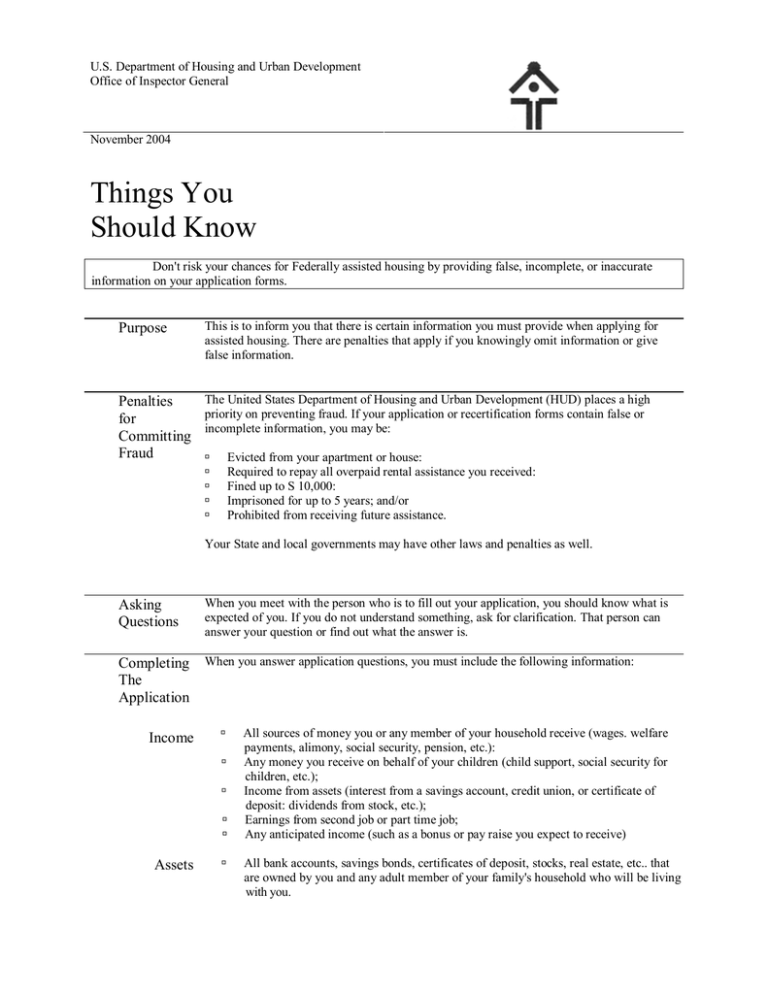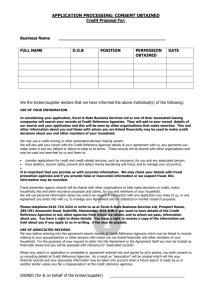Things You Should Know
advertisement

U.S. Department of Housing and Urban Development Office of Inspector General November 2004 Things You Should Know Don't risk your chances for Federally assisted housing by providing false, incomplete, or inaccurate information on your application forms. Purpose This is to inform you that there is certain information you must provide when applying for assisted housing. There are penalties that apply if you knowingly omit information or give false information. Penalties for Committing Fraud The United States Department of Housing and Urban Development (HUD) places a high priority on preventing fraud. If your application or recertification forms contain false or incomplete information, you may be: Evicted from your apartment or house: Required to repay all overpaid rental assistance you received: Fined up to S 10,000: Imprisoned for up to 5 years; and/or Prohibited from receiving future assistance. Your State and local governments may have other laws and penalties as well. Asking Questions When you meet with the person who is to fill out your application, you should know what is expected of you. If you do not understand something, ask for clarification. That person can answer your question or find out what the answer is. Completing The Application When you answer application questions, you must include the following information: Inco me Assets All sources of money you or any member of your household receive (wages. welfare payments, alimony, social security, pension, etc.): Any money you receive on behalf of your children (child support, social security for children, etc.); Income from assets (interest from a savings account, credit union, or certificate of deposit: dividends from stock, etc.); Earnings from second job or part time job; Any anticipated income (such as a bonus or pay raise you expect to receive) All bank accounts, savings bonds, certificates of deposit, stocks, real estate, etc.. that are owned by you and any adult member of your family's household who will be living with you. Any business or asset you sold in the last 2 years for less than its full value, such as your home to your children. The names of all of the people (adults and children) who will actually be living with you, whether or not they are related to you. Signing the Application Do not sign any form unless you have read it, understand it, and are sure everything is complete and accurate. When you sign the application and certification forms, you are claiming that they are complete to the best of your knowledge and belief. You are committing fraud if you sign a form knowing that it contains false or misleading information. Information you give on your application will be verified by your housing agency. In addition, HUD may do computer matches of the income you report with various Federal, State, or private agencies to verify that it is correct. Recertifications You must provide updated information at least once a year. Some programs require that you report any changes in income or family/household composition immediately. Be sure to ask when you must recertify. You must report on recertification forms: All income changes, such as increases of pay and/or benefits, change or loss of job and/or benefits, etc., for all household members. Any move in or out of a household member; and, All assets that you or your household members own and any assets that was sold in the last 2 years for less than its full value. Beware of Fraud You should be aware of the following fraud schemes: Reporting Abuse If you are aware of anyone who has falsified an application, or if anyone tries to persuade you to make false statements, report them to the manager of your complex or your PHA. If that is not possible, then call the local HUD office or the HUD Office of Inspector General (OIG) Hotline at (800) 347-3735. You can also write to: HUD-OIG HOTLINE, (GFI) 451 Seventh Street, S.W., Washington, DC. 20410. HUD- 1140-OIG Do not pay any money to file an application; Do not pay any money to move up on the waiting list; Do not pay for anything not covered by your lease; Get a receipt for any money you pa y; and, Get a written explanation if you are required to pay for anything other than rent (such as maintenance charges). THIS DOCUMENT MAY BE REPRODUCED WITHOUT PERMISSION

